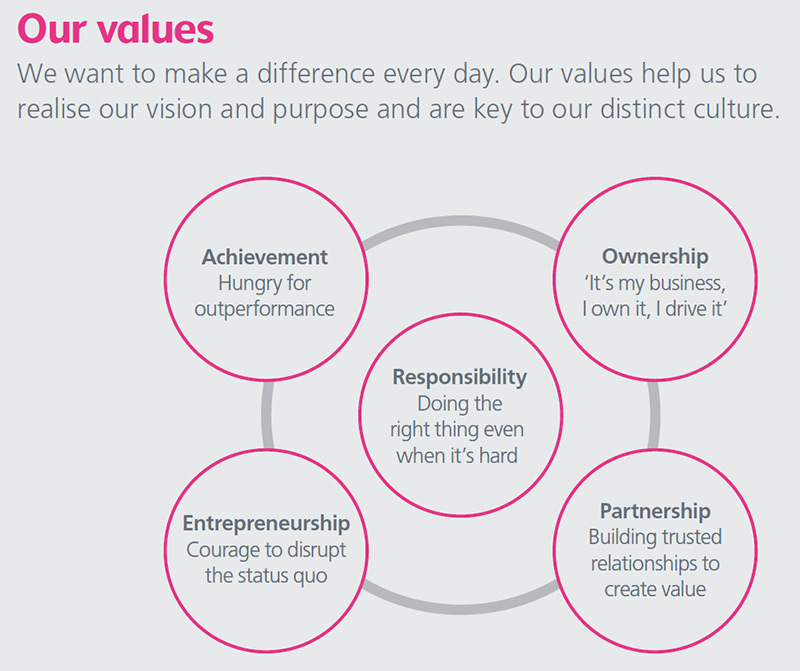Forthcoming December year ends will be first which have to comply with the 2018 UK Corporate Governance Code. This introduces several new reporting requirements, including the need for boards to establish the company’s purpose.
Specifically, the new Code states that “the board should establish the company’s purpose, values and strategy, and satisfy itself that these and its culture are aligned.”
While the Code doesn’t explicitly say that the purpose must be described in the annual report, it would be pretty odd not to do so, given that the Code establishes it as a key part of the strategic framework.
What do we mean by ‘purpose’?
In its Guidance on the Strategic Report, the Financial Reporting Council states that an entity’s purpose is why it exists.
The obvious response to this is that companies exist to make money for their shareholders. But that’s not their purpose. Companies can only make money for shareholders (at least in the long term) if:
- they provide a product or service that customers are willing to pay for; and
- that product or service provides benefits (or social value) to its users.
The purpose therefore encapsulates what the company does and the value it creates in doing so. By stating what the company does (and by extension what it doesn’t do), a well-articulated purpose becomes a tool that the company can use to assess its new product development, potential M&A and its overall strategy. This makes it an important governance tool.
A company’s purpose is unlikely to change much over time and any change will be slow. This makes it a useful starting point for long-term decision making.
What’s the state of play?
Many companies have already defined their purpose in their most recent annual reports but the quality of these statements is variable, to say the least. In numerous cases, they only focus on the social value element. The resulting statement is more like a marketing strapline and as a result it is hard to align the purpose with the company’s strategy or its culture and values.
Who does it well?
We think Reckitt Benckiser’s is a great example of a well-articulated purpose.
RB has two businesses: Health, which makes consumer healthcare products, and Hygiene Home, which makes household products such as dishwasher detergents.
RB has the following purpose:

This conveys a lot of information in a single sentence. The key parts are:
- “innovative” – RB focuses on new products and avoids anything generic or “me too”
- “solutions” – the offering is not just physical products and can include complementary digital services, such as apps
- “healthier lives and happier homes” – this has a dual meaning, defining both the social purpose the company delivers (improved health and homes that are more pleasant to live in) and the business areas the company wants to operate in (consumer health and household products).
This neatly encapsulates both offering and value creation, making it highly practical for use within the company, as described above.
The social value element of your purpose
It’s worth noting here that the social value described by RB is the value inherent in the products it makes. Companies will often look to create additional social value beyond this, but this value results from strategic choices and culture, rather than part of the purpose itself.
For example, a company could pursue exactly the same purpose by:
- following a strategy of maximising profit, while complying with the minimum legal requirements for environmental protection and health and safety; or
- putting the needs of customers and other stakeholders ahead of short-term financial performance, in the belief that this will result in better long-term returns.
The amount of social value created could be very different under these two scenarios. It’s important, therefore, that the purpose doesn’t try to encapsulate social value that actually results from strategic choices. This is one area where many companies’ purposes currently overstep the mark.
Connecting purpose to strategy and values/culture
A well-defined purpose should clearly link to the company’s strategy and values. RB has a three-part strategy:

Here, “better business” directly supports the achievement of RB’s purpose. “Better society” and “better environment” are linked to the additional social value the company looks to create.
RB has five values, as shown below. These inform a culture of innovation, that is fast moving and forward looking, and where people take responsibility for delivery while working in the right way. There is a clear link between these values and the company’s purpose, as well as the broader social value it looks to create.

Conclusion
We think too many companies have misunderstood the purpose of purpose and are missing out as a result. Defined properly, it’s an immensely powerful tool for managing the company, while also helping you to communicate the non-financial value you create. This is only going to become more important in a world where trust in business is far too low and has to be restored.
Talk to us
We’re probably the UK’s best-qualified annual report copywriters. We can write your report or advise you on the content and best practice. Contact us to find out more.





